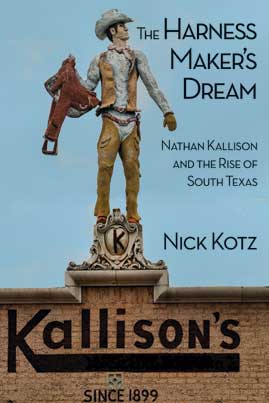Nick Kotz, The Harness Maker’s Dream: Nathan Kallison and the Rise of South Texas, TCU Press, 2013, ISBN 9780875655673, 320 pages, $25.95.
By Donald H. Harrison


SAN DIEGO–I suppose the thing that makes me the saddest about The Harness Maker’s Dream is that the “villain” in this excellent-reading story about the Kallison family empire in San Antonio, Texas, was a man that so many of us San Diegans admire: Sol Price, although he is not mentioned by name in this family memoir by journalist Nick Kotz.
Sol Price and his son Robert are among the merchant philanthropists of whom we Jews are most proud in San Diego, just as many Jews of San Antonio revere the memories of Nathan Kallison and his sons Morris and Perry. From what was initially a harness maker’s store, Nathan expanded his enterprise into Kallison’s Big Country Store, and then, so he could understand his customers better and sell them products he could personally recommend, he purchased and developed Kallison Ranch where he raised Texas Polled Hereford cattle. Today the ranch is part of the sprawling South Texas state park known as the Government Canyon Wildlife and Natural Area.
At the beginning of Chapter 14 of this book, the conflict between these two generous, community-minded Jewish families–the Kallisons of San Antonio and the Prices of San Diego–comes to light, but to recognize it, you need to know that Sol Price was the founder of Fed-Mart, in which he pioneered a mass merchandising concept that he later brought to fruition with Price Clubs, which since have been merged into Costco’s. You should also know that Sam Walton, founder of Walmart, freely admits that he got his inspiration for his big-box, discount stores from everything that Sol Price was doing.
Writes Kotz: “Perry Kallison had first glimpsed the dawn of a new era in 1954, the day he attended the grand opening of Fed-Mart, a different kind of department store. Thousands had gathered for the festive evening event in front of the nearly block-long store at Military Road and Zarzamora Street in San Antonio. As the crowd surged into the store, giant searchlights lit the sky like those at a Hollywood movie premier (sic). In the postwar era, the giant new discounter was promising that its Family Saving Centers would ‘save you money on just about everything for your family, your home, and your car.’ Flanked by four of his department managers from Kallison’s store, Perry carefully checked the prices on the displays of leading brand names in furniture, appliances, clothing and sporting goods equipment. He was stunned.”
In that Sol Price was saving money for the consumers, even more money than they could save at Kallison’s, you’d have to say that Price was doing a service. He was a force for progress in the retailing world, a force which Perry Kallison recognized, but to which Perry, set in his ways, just couldn’t adapt. This was a big difference between Perry and his father, Nathan, the harness maker, who in the early 20th century saw automobiles become increasingly popular and realized that he needed to find some other way to make money besides harness-making.
The truth be known, brothers Perry and Morris had become too complacent in their status as the second-generation owners of a famous store and ranch. Morris had turned his attention to downtown real estate and to being a kingmaker in municipal politics. Perry had transformed what originally was an extended commercial to promote the store into a popular, home-spun “Trading Post” radio program in which he gained celebrity as the dispenser of advice about conservation, sermons on good ol’ fashioned, kindly American values, and purveyor of tidbits about his listeners’ personal accomplishments. The third generations of Kallisons, college educated, tried to convince the brothers that the sprawling store needed to adopt modern accounting methods, and eliminate outdated departments, but the youngsters were brushed aside. Eventually Kallison’s Big Country Store, a landmark for a half-century, went under.
So, the Kallisons’ undoing as a retailing family was not only Sol Price’s fault, but, to a large extent, their own as well.
Nevertheless, you can’t help but feel a measure of regret, especially after reading Kotz’s account of the empire built up by his grandfather Nathan and the generosity of his uncles Perry and Morris. Besides being moving forces in many of San Antonio’s civic and Jewish charities, the Kallisons also helped Israel establish a mohair industry (based on Angora goats raised in Texas). They also were early friends and supporters of President Lyndon Baines Johnson, who as a young congressman from Texas was a supporter of federal programs to bring the benefits of electricity to rural ranchers — the Kallisons’ best customers.
What makes Kotz’s book rise above a family memoir is that he skillfully weaves into it nearly a century of social and political history of the United States. In addition to an extensive section on LBJ, I counted references to nine other U.S. Presidents dating back to Theodore Roosevelt. Kotz, a Pulitzer Prize winning journalist, won fame his exposé about unsanitary conditions in meat packing houses. Given his roots in the cattle industry, his reportage may be construed as yet another example of the Kallisons’ philanthropic legacy.
*
Harrison is editor of San Diego Jewish World. He may be contacted via donald.harrison@sdjewishworld.com